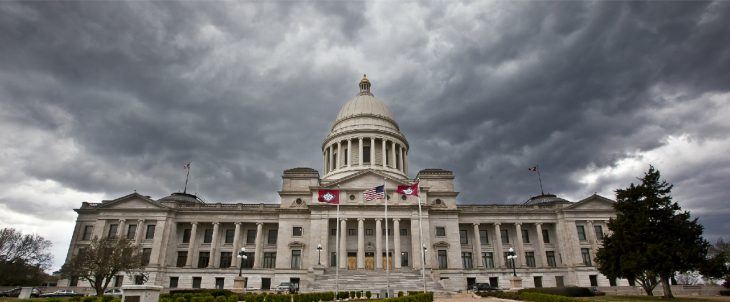Transgender restriction bills advance; FOIA, partisan municipal elections measures fail
by March 10, 2021 7:21 pm 1,003 views

High profile bills advanced in the House and Senate on Wednesday (March 10), while measures specific to municipal elections and local Freedom of Information Act (FOIA) compliance stalled in committee.
The state Senate advanced SB 354 by Sen. Missy Irvin, R-Mountain View. The bill would prohibit transgender women from participating in women’s sports. After passionate debate from supporters and opponents of the bill, it passed the heavily Republican body on a 28-7 vote.
In the House, HB 1570 by Rep. Robin Lundstrum, was the center of heated floor controversy. The bill prohibits administering gender transition treatment, including surgery and hormone therapy, to transgender people under the age of 18.
In committee testimony yesterday regarding the bill, it was reported that no surgeries on minors are being conducted in Arkansas. There are some puberty-blocking drugs being administered to minors to slow down enhanced sex characteristics.
The measure passed the House after heated debate by a 70-22 vote.
Both of the transgender-related bills have to move through the opposite chambers and are likely to wind up on Gov. Asa Hutchinson’s desk. If they become law, they face potential litigation.
COMMITTEE ACTION
An Arkansas House bill that would allow public entities such as city council and county quorum courts to meet in executive session to discuss certain economic development projects failed in committee Wednesday. HB 1280, sponsored by Rep. Delia Haak, R-Centerton, met fierce opposition from media representatives and committee members.
Haak, along with Arkansas Municipal League lead council John Wilkerson, told committee members that economic development in the state is at times stifled due to the state’s FOIA requirements. Many businesses like to keep their plans for expansion secret from competitors, she said.
FOIA allows for two elected officials within an elected body, such as a mayor and city council member, to meet and discuss city business without public scrutiny as long as the council member isn’t being “polled” as to how they might vote on an issue, Wilkerson said. Theoretically, a mayor could meet with every city council member to talk about potential economic development projects without the public’s knowledge.
The bill would streamline that process and require an oral summary at the end of the executive session, he added.
Rep. Howard Beaty Jr., R-Crossett, criticized HB 1280. He said Haak and Wilkerson could not name a single instance in which a job or jobs were lost in the state due to this law not being in place.
“I take offense to this bill. This is not about economic development … I respect Rep. Haak … her heart is in the right place, but this is a bad bill,” he said.
Arkansas Press Association President Rusty Turner said the bill violates the intent of the state’s FOIA law passed in 1967. It would allow for “deals to be done in the dark” with the public’s money, property and other assets. Addressing economic development issues in public can be a messy process, but the public has a right to know how their funds are being spent, he added.
In the House State Agencies & Governmental Affairs Committee, there was a brief discussion of three proposed constitutional amendments that could be referred to voters in the 2022 general election. The three measures discussed today, but not voted on, were HJR 1002, 1003 and 1004. They dealt with ad valorem taxes, phasing out property taxes, and payment of public debt.
A longer discussion was held on HB 1655 by Rep. Clint Penzo, R-Springdale. The measure would mandate partisan municipal elections in Arkansas cities without city manager forms of government.
Candidates for most municipal offices, such as mayor or city council, now file as independents. HB 1655 would set filing fees for the municipal partisan offices at a maximum of $25. The measure failed the House committee on a roll call vote, but it is likely to come back in another form.
TB&P DAILY
Sen. Joyce Elliott, D-Little Rock, was a guest on Talk Business & Politics Daily. She discussed legislation affecting local school control, hate crimes, transgender rights, an innovative retirement bill, and the arts and economy.
Elliott said she is working to run her SB 314, which outlines how local school districts can exit state control. The Little Rock School District has been under state control of some sort for six years. She also said she would not be open to amending any protected group out of the controversial hate crimes legislation, SB 3.
You can watch her full interview in the video below.
Editor’s note: TB&P’s George Jared contributed to this article.
